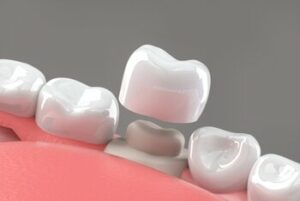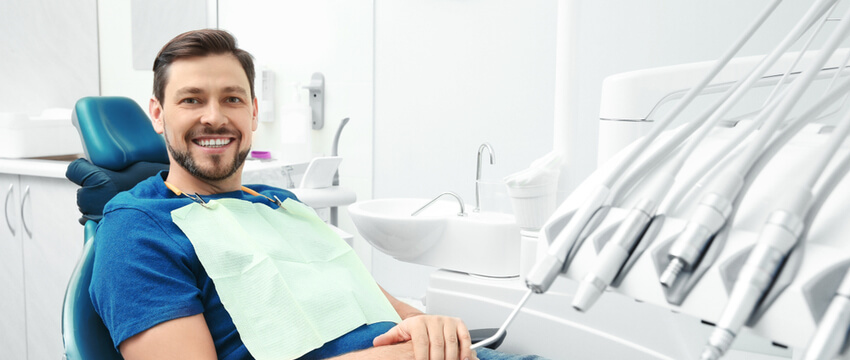Also known as dental caps, dental crowns are tooth restorations that are used to protect and strengthen your teeth. A dental crown can change the shape, size and appearance of a tooth while protecting it against damage and decay. Today we are going to answer the question of ‘what are dental crowns’ as well as what you can expect from the dental crown procedure.
What Are Dental Crowns?
A dental crown is a cover or cap that is placed over your whole tooth. The cap encases the visible part of your tooth so that it is not subject to further decay or damage if it has been weakened. There are different types of materials that can be used to manufacture a dental crown, and the best choice of material will depend on factors like cost, strength and durability. The location of the dental crown in your mouth will determine how strong and durable it needs to be.
What Are Dental Crowns Used For?
Dental crowns are versatile; they can be used for a variety of applications:
- To cover up a tooth that has already been restored by a dental filling
- To protect and strengthen a tooth that is weak and at risk of breaking
- To protect a tooth that has been worn down
- To anchor a dental bridge into position
- To cover up teeth that are discoloured or misshapen
- To cover up and complete dental implant treatment
- To make cosmetic changes to the appearance of your smile
How Does The Dental Crown Procedure Work?
If you are having a dental crown made, you are likely to visit your dentist’s office at least twice. During the first visit, your dentist must prepare your tooth for the dental crown. During your second visit, the dental crown will be attached to your tooth.
The Dental Crown Procedure: The First Visit
The first time you visit your dentist he or she will want to take an x-ray to make sure the tooth root and the surrounding jaw bone are healthy. If your tooth pulp is damaged or decayed, you may need a root canal treatment first.
If not, your dentist will prepare your tooth to receive the dental crown. This is done under local anaesthetic so you do not feel pain during the dental crown procedure. Your dentist will reshape your tooth and remove some of the dental enamel on the sides and chewing surface. Conversely, if you are already missing a significant portion of your tooth, your dentist might need to use filling material to build it up.
When your tooth has been reshaped, your dentist will need to take an impression or digital scan of the tooth. These scans or impressions will be sent to a dental laboratory to start the process of making the dental crowns. Because it can take two to three weeks to manufacture the dental crowns, temporary crowns will be fitted for you while you wait.
The Dental Crown Procedure: The Second Visit
During your second visit, the temporary crowns will be removed. Your dentist will check the colour and fit of the permanent dental crowns and if you are happy with both aspects, your dentist will attach them in position with dental cement.
What Are Dental Crowns Made From?
There are quite a few options for dental crowns, which your dentist will discuss with you before making yours:
- Zirconia
- Porcelain
- Ceramic
- Metal
- Composite resin
- Combinations of different materials
For dental crowns at the front of your mouth, most patients prefer materials that closely resemble their natural teeth, like zirconia, porcelain and ceramic. For dental crowns at the back of the mouth, stronger and more resilient materials are usually preferred.
How Do You Know What Is The Best Material For Your Dental Crown?
Your dentist will discuss different factors with you to decide what the best material choice for your dental crown is. You will consider things like
- The position of the tooth
- Whether the tooth is a biting or chewing tooth
- How much natural tooth you have left
- What colour the surrounding tooth is
In many cases, a combination of materials may be favoured in order to get the right colour match and ensure the dental crown is strong enough for biting and chewing. You will also want to know how the cost of the different materials compares before you make a choice.
For more information on ‘what are dental crowns’ or how dental crowns could benefit your oral health, it’s best to speak to a professional. Please contact us for an appointment: (02) 9158 6379.
References
Everything You Need to Know About Getting a Dental Crown
https://www.healthline.com/find-care/articles/dentists/dental-crown
Dental Crowns
https://www.webmd.com/oral-health/guide/dental-crowns






